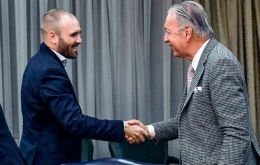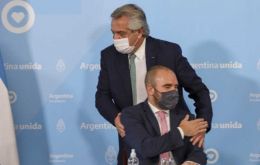MercoPress. South Atlantic News Agency
Tag: Martin Guzman
-
Tuesday, April 19th 2022 - 09:33 UTC
Argentine Gov't proposes new tax to alleviate burden on the neediest

The Argentine Government of President Alberto Fernández Monday announced it planned a new tax which was called “the windfall income,” to be levied on companies that last year had profits over AR$ 1 billion (around US$ 5 million at the unofficial exchange rate).
-
Monday, April 18th 2022 - 08:37 UTC
Argentina has too many pensioners, according to an IMF report

A recent report by the International Monetary Fund (IMF) has underlined the fact that Argentina has a larger proportion of citizens earning pensions when compared to other countries in the world.
-
Saturday, April 2nd 2022 - 09:55 UTC
Argentina focused on ties with US

Argentina's Economy Minister Martín Guzmán met Friday with US Ambassador Marc Stanley at the Treasury Palace in Buenos Aires to discuss the bilateral agenda regarding cooperation between the two countries.
-
Wednesday, March 30th 2022 - 09:59 UTC
Cold winter and fuel shortages ahead for Argentina

Argentina is on the world's top short list of countries with the largest reserves of gas, but given its political chaos, rabid nationalism and constant changes to the rules of the game, investors remain shy and Argentina will have to prepare for a cold austral winter and even fuel rationing as it's already happening with diesel, desperately needed to harvest summer crops and prepare the soil for summer sowing.
-
Wednesday, February 23rd 2022 - 09:54 UTC
World Bank support for Argentina in 2022 expected to reach US$ 2bn

A top-level Argentine economic and strategic delegation met in Washington with the World Bank Managing Director of Operations to address close bilateral relations, cooperation, and solid support from the bank for South America's second-largest economy.
-
Tuesday, February 1st 2022 - 09:11 UTC
Argentina: Máximo Kirchner resigns as Lower House majority leader

The recent deal between the Argentine Government of President Alberto Fernández and the International Monetary Fund (IMF) is taking its toll on the country's political leadership front after Lower House Majority Leader Máximo Kirchner announced Monday he would resign that position.
-
Tuesday, January 11th 2022 - 13:50 UTC
Argentina's covid Miracle

By Joseph Stiglitz – Unlike the United States, which could spend one-quarter of its GDP protecting its economy from the COVID-19 fallout, Argentina entered the pandemic with the deck stacked against it. Yet, thanks to the current government’s policies to strengthen the real economy, the country has been enjoying a remarkable recovery.
-
Thursday, January 6th 2022 - 22:11 UTC
Black Thursday for Argentina's economy – no agreement with IMF

Argentine President Alberto Fernández and Economy Minister Martín Guzmán agreed not to give in to additional demands from the International Monetary Fund (IMF) regarding the US $ 44 billion loan from the previous national administration.
-
Monday, November 22nd 2021 - 09:58 UTC
Fears of devaluation loom over Argentina as Central Bank reserves run almost dry

Argentine Economy Minister desperately needs to reach an agreement with the International Monetary Fund (IMF) this week, because the Central Bank (BCRA) has only US $ 800 million left in cash with which to intervene in the local exchange market, which is pressing for a devaluation.
-
Thursday, November 11th 2021 - 09:30 UTC
Unofficial US dollar crosses 200-peso threshold in Argentina

As next Sunday's mid-term elections loom over and the government of President Alberto Fernández seems headed for inevitable defeat, desperate Argentinians turned to the currency black market to convert their volatile pesos into US dollars, thus piercing the psychological AR $ 200 threshold for the first time.
